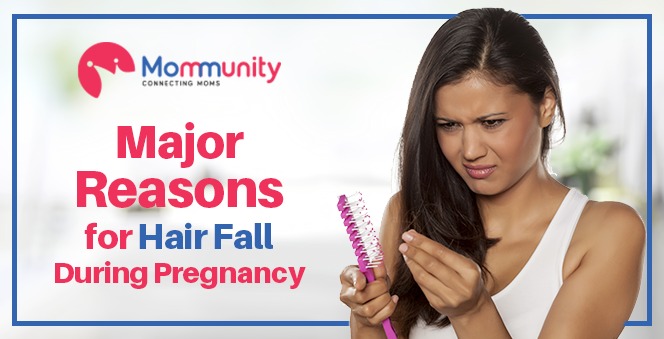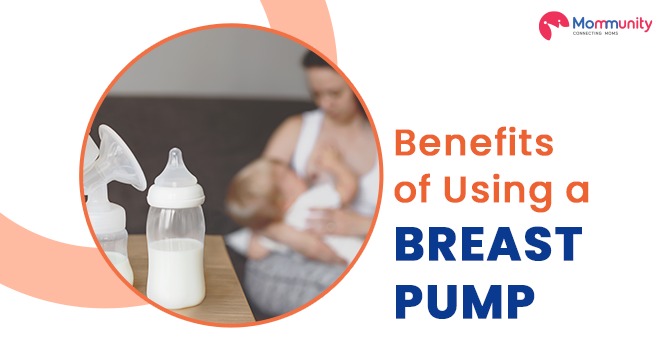Pregnancy brings about numerous changes in your body. Hair loss during postpartum is one of them. Though many women undergo beautiful hair growth during pregnancy due to hormonal fluctuations, hair fall after delivery is a common phenomenon. Post-delivery, new moms suffer from drastic hair fall as the hormones are adjusting themselves and returning to their normal phase. It takes about 9 to 12 months for the hair growth cycle to get back to normal. The abnormalities in hormones vary from woman to woman. This can cause dryness and weakened hair roots which results in pregnancy hair loss. In this article, Mommunity helps you understand if hair loss is normal during pregnancy and what you can do to control it.
IS HAIR FALL NORMAL DURING PREGNANCY?
Hair fall in early pregnancy is normal but less common as compared to the loss after delivery. Pregnant women usually enjoy thicker, gorgeous hair, as the growth cycle of the hair halts in the resting period. The hair fall cycle is delayed until after delivery. But in certain cases, hair fall may occur during pregnancy, depending on one’s health or sometimes it could be hormonal fluctuations. You should keep a check on your hair growth between 6 to 12 months post-delivery. Consult your doctor if the intensity continues, as it may be a hair loss pregnancy symptom and is occurring probably because you have some vitamin deficiency.
WHAT CAUSES HAIR LOSS DURING PREGNANCY?
Hormonal fluctuations and physical changes could lead to hair loss. It is temporary and lasts until the baby is born. Other reasons for hair fall during pregnancy are:
1. POOR NUTRITION
Your body requires more nutrition during pregnancy. The iron requirement is high and insufficient intake could result in hair loss. Also, the lack of protein, vitamins, and minerals (such as zinc) in the body can be a contributing factor. Moreover, the consumption of excess vitamins, such as the retinol form of vitamin A, can also cause hair loss.
2. ILLNESSES
Some illnesses, such as gestational diabetes and ringworms can lead to hair loss. Certain medications used to treat high blood pressure, depression, and anxiety could increase the risk of hair fall.
3. USUAL HORMONAL CHANGES
Hair changes during pregnancy are a result of changes in hormones that are common in this phase. The fluctuation of hormones pauses or interrupts the usual hair growth cycle, resulting in excessive hair shedding or telogen effluvium.
4. GENETICS PLAY A ROLE
Genetics plays a role in hair fall too, which means if your parents had the same problem, you too are likely to be affected. Medication and treatment could help handle hair fall that has a genetic origin.
5. DEFICIENCY IN THYROID HORMONE
Hypothyroidism is identified by a decline in the production of thyroid hormone in the body and is normal among women these days. This hormone is responsible for maintaining the basal metabolic rate, digestive system, mental health, and even the nails and hair and their deficiency could cause hair loss.
6. POLYCYSTIC OVARY SYNDROME
PCOS is a hormonal disproportion that causes the ovaries to produce male hormones in excessive quantities. As most women affected by this condition experience increased hair growth, some of them may notice hair loss around the scalp region.
7. SKIN DISEASES OF THE SCALP
Skin allergies and conditions affecting the scalp could also be a reason for the thinning of hair and hair fall.
8. REPRODUCTIVE CAUSES
Discontinuing the usage of birth control medications or any other birth control method can cause hair loss. You may also experience hair loss due to miscarriage, abortion, and stillbirth.
Hair loss is not a medical emergency. But the primary cause, such as nutritional deficiency or illness, can be damaging. You should consult a doctor if you experience excessive hair shedding during pregnancy.
HOW TO CONTROL HAIR FALL DURING PREGNANCY?
Hair fall is during or after pregnancy is not a major concern, as the condition is temporary and gets back to normal soon after delivery. But there may be basic conditions like illness or nutritional deficiency, which can cause hair fall and needs to be observed, as they might be harmful to the mother and the baby. Here are some useful hair loss treatment suggestions that can help you in reducing hair fall.
1. OIL YOUR SCALP
Oiling your scalp regularly can be very beneficial for the health of your hair. Apply and massage your scalp with lukewarm oil twice a week before going to sleep to nourish your hair. Coconut oil, almond oil, mustard oil and olive oil are some of the best nourishing oils.
2. AVOID HEAT STYLING
Try to avoid straightening, blow-drying and going for other hairstyles, rather maintain your natural hair type. Be gentle with wet hair and use a wide-toothed comb to untangle it.
3. MAINTAIN A HEALTHY DIET
The expecting mothers must consume food having necessary nutrients required for the well-being of herself and her baby. It is suggested that you choose a diet high in vegetables and fruits, containing antioxidants and flavonoids as it encourages hair growth and protects the hair follicles.
4. TRY MEDITATION
Stress is one of the main reasons for hair fall during pregnancy. It is normal for a pregnant woman to be tensed about her delivery and any possible negative situations, but you should try and be stress-free during pregnancy. Breathe, relax and try meditation to free yourself from worries or tensions and focus only on the good things and do whatever makes you happy.
5. AVOID CHEMICAL PRODUCTS
A variety of hair care products are found in the market that claims to solve all the problems related to hair fall, but it is suggested to avoid them when you are pregnant. These products are unsafe for pregnant women, as they may contain harmful chemicals. Only shampoos and conditioners that contain biotin and silica should be used.
6. NO WET COMB
Combing wet hair just after a shower to untangle it should be avoided because the hair follicle is very soft and easy to pluck because of which a lot of hair falls out. Hence, the best way is to wait for the hair to dry out naturally. You may use a towel to help it dry.
HOME REMEDIES TO TREAT HAIR FALL IN PREGNANT WOMEN
There are many reasons due to which women experience hair loss when pregnant. Besides preventive care for hair loss, you can even try some home remedies. Here are some effective home remedies:
1. WARM OIL MASSAGE
One well-known therapy is a head massage. Massage your scalp with lukewarm oil to help you control hair fall. Some of the best nourishing oils are coconut, jojoba, almond and olive etc.
2. ALOE VERA GEL
Aloe-vera extracts are extensively used for the treatment of skin disorders. Apply the gel on your scalp to cure dryness and infection thus reducing hair fall.
3. GO ORGANIC
Hair fall could be a result of skin infections or allergic reactions of the scalp. Organic products are safe for sensitive skin and all skin types. To avoid such allergies and infections natural and organic products should be used for the hair.
4. A MIXTURE OF OILS
Apply a mixture of six tablespoons of castor oil and one-fourth teaspoon of lavender essential oil on the scalp and wash it off after an hour. However, consult your doctor before using essential oils as some of them are not recommended during pregnancy.
5. ANTIBACTERIAL NEEM
Neem is a medicinal herb that is effective in tackling hair fall caused by skin infections. Its antibacterial properties restrain the growth of bacteria. A paste of fresh neem leaves could be applied to your scalp.
6. AMLA TO THE RESCUE
The Indian Gooseberry, familiar as amla, is regarded to be the best natural remedy for hair fall. Amla powder could be consumed orally or its oil could be massaged on your scalp. It helps strengthen hair and stops hair fall.
7. FRESH COCONUT MILK
Arrange half a cup of fresh coconut milk and massage it into the scalp with your fingertips. Let it get absorbed for 20 to 30 minutes and then rinse it using a herbal shampoo. This nourishes the scalp.
8. LEMON JUICE
Apply a mixture of one tablespoon lemon juice and one beaten egg, to your scalp and let it stay for about 30 minutes, and rinse. It helps to stop hair fall and makes your hair look silky and thick.
9. SOAKED FENUGREEK SEEDS
Massage your hair with a fine paste of fenugreek seeds that have been soaked overnight, and wash it off after a gap of 3 to 4 hours. It gives shine to your hair and encourages hair growth.
10. EGG, YOGURT, AND OLIVE OIL
Prepare a paste of equal quantities of a mixture of egg, yogurt, and olive oil and apply it on your scalp once a week to deeply condition your hair.
Hair fall is a common occurrence, and experiencing increased hair fall during and after pregnancy is normal. Taking some extra care of your hair during this delicate period is surely going to help you control the issue.




